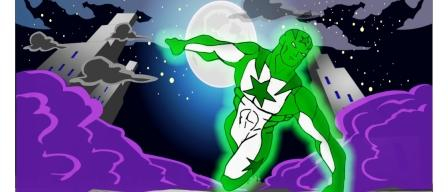
It’s just another day in the fictional town of Halwapur, when mayor Vadero Pajero orders local thug Baba Bandook to shut down the girls’ school. “What will girls do with education when they will grow up to scrub floors and cook meals,” they mock. But then the now-famous Burka Avenger swoops in. Using her takht kabaddi skills — combat with pens and books — she thwarts the evil plan and the school is reopened.
But Jiya, aka Burka Avenger, heroine of the eponymous TV series, isn’t the only one. The country is in overdrive, creating animated characters who are regular people by day and crimefighters by night. Kachee Goliyan, possibly Pakistan’s first comic book company, recreated Umru Ayar, a phenomenal figure in Urdu literature, in a comic book. Nofal Khan, Editor, Kachee Goliyan, says, “Whenever we visualised the stories of Umru Ayar, we thought of them as action-packed, exciting adventures, with Ayar moving in and out of different realms, fighting off evil wizards. A lot of people grew up reading his stories and we wanted to invoke nostalgia.”
Role models
A silent cultural revolution is brewing in Pakistan’s art, entertainment and literature scenes. It’s bold, tough and the people’s desperate desire for real change is unmistakable. “Positive role models are very important for Pakistani society. Real-life people can turn out to be imperfect but fictional characters can be projected with the highest morals and values. Wonder Woman or Catwoman may not resonate in Pakistani society, but Burka Avenger does,” says Haroon Rashid, its creator, who is a pop star. The character was number nine on Time magazine’s list of most influential characters of 2013 and there are talks of broadcasting the show in 60 countries soon.
Burka Avenger’s key theme is educating girls and women, which is especially significant in a country with profoundly conservative areas. This is also reflected in real-life hero Malala Yousafzai’s goals. Yousafzai is known for being an education and women’s rights activist, which got her shot by the Taliban in 2012.
Rich narratives
Syed Hamdani created Sergeant Pakistan as a comic and a set of ongoing novellas so that Pakistani kids could look up to someone with humble beginnings who stands up against terrorism. “While watching the news one day, I saw a report of children playing suicide bombers in a game. I have a six-year-old son and I couldn’t stand watching that. It is a failure of humanity if children portray themselves as terrorists,” he says. The first novella is out on Amazon’s Kindle device and proceeds from the project will go to charity.
Meanwhile Pakistan’s first superhero film, Nation Awakes, an ambitious project produced by Aamir Sajjad Ventures, is scheduled for global release in 2016. The superhero, Pakistan, will be portrayed by Aamir Sajjad and the
English-language film has already garnered 148,922 likes on Facebook. “Nation Awakes will deal with things on a global level, where Pakistan will fight for humanity in general. For most people it will be a very different experience to watch a Muslim superhero in action for the first time. The basic aim of this film is to change perceptions,” says Sajjad.
These superheroes reflect the Pakistani people’s desire for social and cultural change. Dr Chloe Gill-Khan, Post-Doctoral Research Fellow at the University of South Australia, who studies Pakistani culture and politics, says, “The rise of animated characters and Pakistan’s first-ever superhero film form a crucial part of the broader urban media revolution that is reformist in its outlook, appealing to visions of national reconstruction on multiple levels. The urban popular and underground music scene, television dramas and shows indicate the strengthening of civic voices. Such cultural expressions have the potential to strengthen Pakistan’s cultural economy, revive healthy debate, educate and also challenge national and international stereotypes.”
These sentiments are echoed in all these projects, which are deeply rooted in Pakistani culture even as they fight the dogmas that have plagued its society for decades. Somewhere, these characters are attempting to find the Pakistan that could have been and establish a connection between its people and the world.
Another upcoming comic project, Shamsheer by Udham Publications, tells the story of a young boy called Nabeel, who discovers a secret ancient power and uses it to fight crime. Zakaullah Khan, co-creator of Shamsheer, says, “We grow up reading Western stories from Marvel or DC but the problem with that is every society’s identity is codified in the stories they tell. When we stop telling our stories and become consumers of external narratives, we choose to kill our culture with our own hands and, inevitably, become confused about our identities.”







